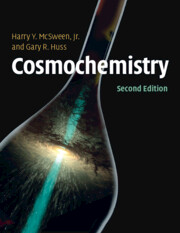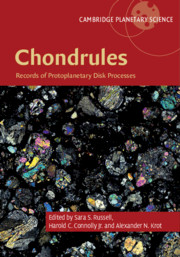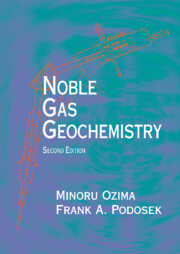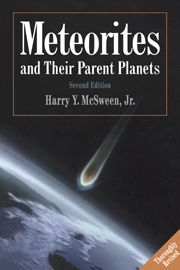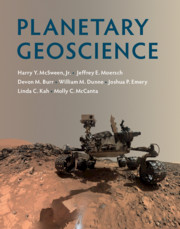Cosmochemistry
2nd Edition
£59.99
- Authors:
- Harry McSween, Jr, University of Tennessee, Knoxville
- Gary Huss, University of Hawaii, Manoa
- Date Published: March 2022
- availability: In stock
- format: Hardback
- isbn: 9781108839839
£
59.99
Hardback
-
Cosmochemistry is a rapidly evolving field of planetary science and the second edition of this classic text reflects the exciting discoveries made over the past decade from new spacecraft missions. Topics covered include the synthesis of elements in stars, behaviour of elements and isotopes in the early solar nebula and planetary bodies, and compositions of extra-terrestrial materials. Radioisotope chronology of the early Solar System is also discussed, as well as geochemical exploration of planets by spacecraft, and cosmochemical constraints on the formation of solar systems. Thoroughly updated throughout, this new edition features significantly expanded coverage of chemical fractionation and isotopic analyses; focus boxes covering basic definitions and essential background material on mineralogy, organic chemistry and quantitative topics; and a comprehensive glossary. An appendix of analytical techniques and end-of-chapter review questions, with solutions available at www.cambridge.org/cosmochemistry2e, also contribute to making this the ideal teaching resource for courses on the Solar System's composition as well as a valuable reference for early career researchers.
Read more- An interdisciplinary approach demonstrates how chemistry, nuclear physics, astrophysics and planetary geoscience can be combined to explain the chemistry of the Solar System
- Provides key background theory and definitions to make complex topics accessible to students from various academic disciplines
- Examples and exercises help students become proficient in the quantitative aspects of the topic
Reviews & endorsements
'Cosmochemistry deserves a wide distribution as a text for undergraduate and research students. Indeed, the book is worthy of the American Astronomical Society's Chambliss Astronomical Writing Award given for textbooks at either the upper-division or graduate level.' David L. Lambert, The Observatory
See more reviews'The authors … have done an admirable job of providing context for the ongoing research in this field, and the current and anticipated results from the exploration of the solar system by spacecraft, including returned samples from asteroids, the Moon, and Mars.' Christopher Herd, American Mineralogist
'It would be effectively impossible for any textbook to capture the current state of cosmochemistry, given the pace of discovery. The authors … acknowledge that their book is a snapshot. However, they have done an admirable job of providing context for the ongoing research in this field, and the current and anticipated results from the exploration of the solar system by spacecraft, including returned samples from asteroids, the Moon, and Mars.' Christopher Herd, American Mineralogist
Customer reviews
Not yet reviewed
Be the first to review
Review was not posted due to profanity
×Product details
- Edition: 2nd Edition
- Date Published: March 2022
- format: Hardback
- isbn: 9781108839839
- length: 452 pages
- dimensions: 260 x 206 x 26 mm
- weight: 1.3kg
- availability: In stock
Table of Contents
1. Introduction to Cosmochemistry
2. Nuclides and Elements – The Building Blocks of Matter
3. Origin of the Elements
4. Solar System and Cosmic Abundances – Elements and Isotopes
5. Presolar Grains – A Record of Stellar Nucleosynthesis and Processes in Interstellar Space
6. Meteorites and Interplanetary Dust – A Record of Nebular and Planetary Processes
7. Element Fractionations by Cosmochemical and Geochemical Processes
8. Stable-Isotope Fractionations by Cosmochemical and Geochemical Processes
9. Radioisotopes as Chronometers
10. Chronology of the Early Solar System
11. The Most Volatile Elements and Compounds – Ices, Noble Gases, and Organic Matter
12. Planetesimals – Leftover Planetary Building Blocks
13. Chemistry of Planetesimals and Their Samples
14. Geochemical Exploration – The Moon and Mars as Case Studies
15. Cosmochemical Models for the Formation and Evolution of Solar Systems
Appendix: Analytical Techniques Commonly Used in Cosmochemistry
References
Index.-
Find resources associated with this title
Type Name Unlocked * Format Size Showing of
This title is supported by one or more locked resources. Access to locked resources is granted exclusively by Cambridge University Press to lecturers whose faculty status has been verified. To gain access to locked resources, lecturers should sign in to or register for a Cambridge user account.
Please use locked resources responsibly and exercise your professional discretion when choosing how you share these materials with your students. Other lecturers may wish to use locked resources for assessment purposes and their usefulness is undermined when the source files (for example, solution manuals or test banks) are shared online or via social networks.
Supplementary resources are subject to copyright. Lecturers are permitted to view, print or download these resources for use in their teaching, but may not change them or use them for commercial gain.
If you are having problems accessing these resources please contact [email protected].
Sorry, this resource is locked
Please register or sign in to request access. If you are having problems accessing these resources please email [email protected]
Register Sign in» Proceed
You are now leaving the Cambridge University Press website. Your eBook purchase and download will be completed by our partner www.ebooks.com. Please see the permission section of the www.ebooks.com catalogue page for details of the print & copy limits on our eBooks.
Continue ×Are you sure you want to delete your account?
This cannot be undone.
Thank you for your feedback which will help us improve our service.
If you requested a response, we will make sure to get back to you shortly.
×
